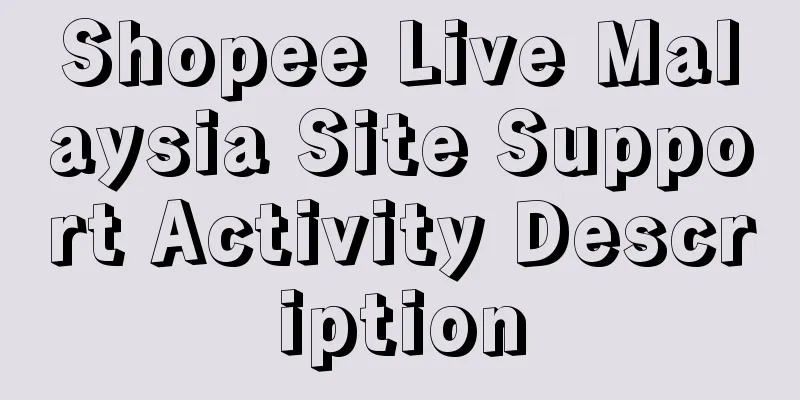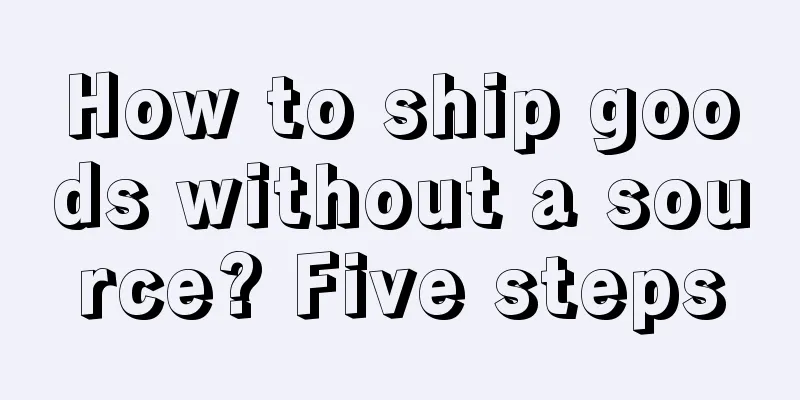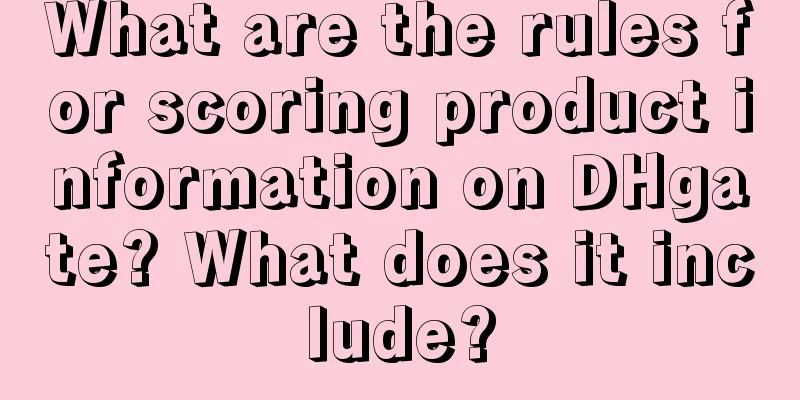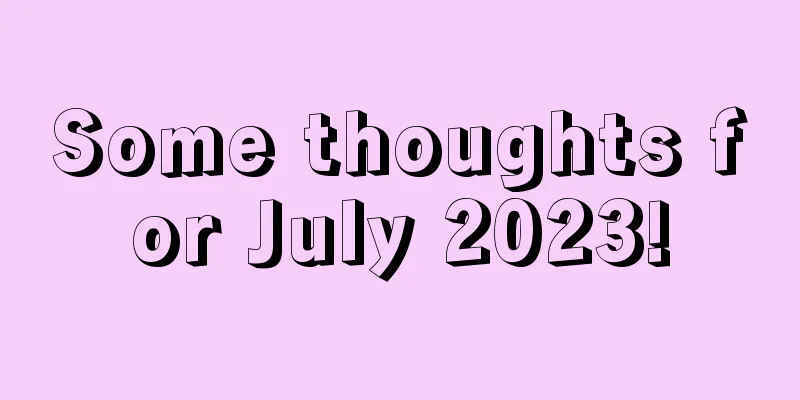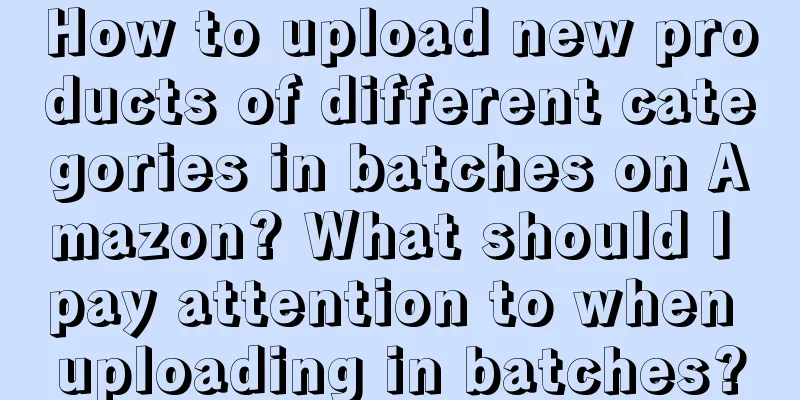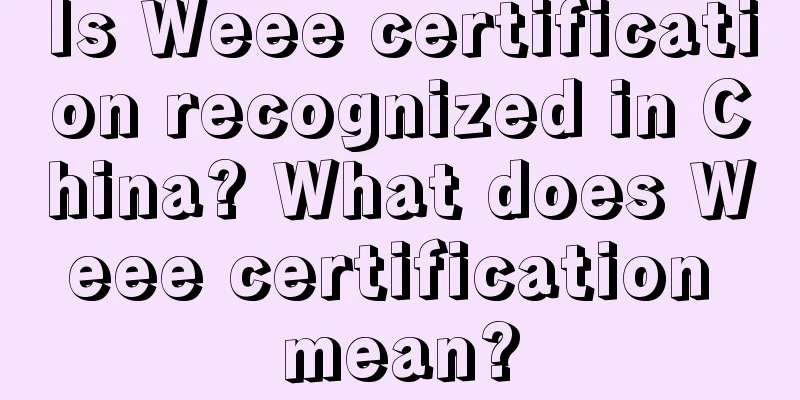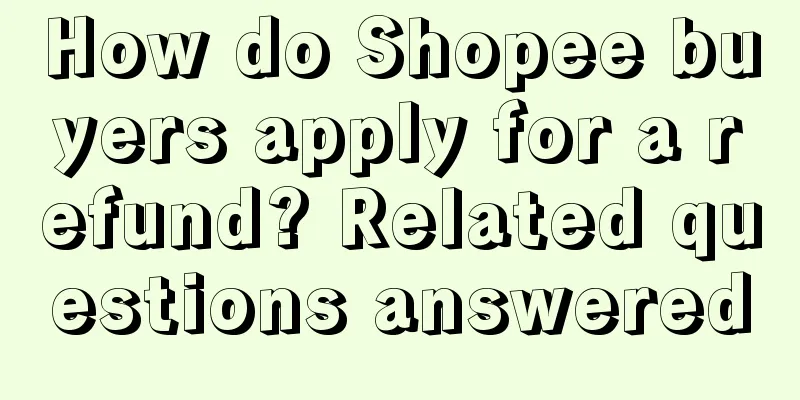Xiaohongshu notes have low traffic? 5 ways to troubleshoot, 24 types of violations or traffic restrictions, quickly save your notes
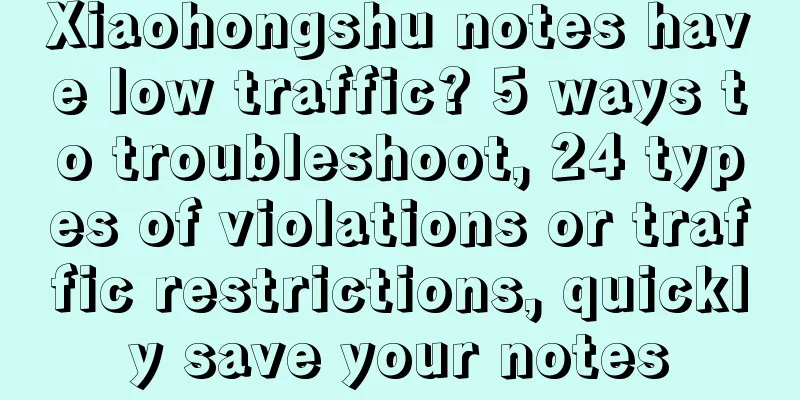
If you work hard on Xiaohongshu, but your Xiaoyan is always in the range of tens or hundreds, then don't rush to update your Xiaohongshu notes. Because your notes may be restricted due to violations. However, unless our notes are particularly illegal, most of the time the flow limiting and violation systems will not tell us directly. So how do you save your notes? Today, I will share 5 methods to quickly check whether there are any violations and traffic restrictions, as well as the 4 common directions of violations and traffic restrictions in Xiaohongshu and their 24 specific manifestations. 1. Xiaohongshu has no traffic, 5 ways to quickly check1.1 View background remindersWhen operating Xiaohongshu, you should pay attention to the official backend information in a timely manner. If the notes violate the rules seriously, you will basically receive a violation reminder in the backend, and it may even be deleted directly by the official. If you receive a violation alert, you should immediately understand the specific content of the alert, including which areas may have problems. If you find any problems, quickly modify or delete the corresponding content to ensure that the notes comply with Xiaohongshu's community standards. Of course, sometimes the official reminders are hard to understand. They just say that the community norms are violated without a general direction. Then you can ask customer service, or find a professional Xiaohongshu operation team to check it, and then modify it according to the prompts. 1.2 See French Fries PromotionIn the operation of Xiaohongshu, checking the promotion of French fries is an important means to understand whether the notes violate the rules. Through simple steps, we can quickly determine whether the notes violate the rules or whether the content of the notes meets the requirements of Xiaohongshu. The specific operation is as follows: click the three bars in the upper right corner and select the French Fries promotion at the bottom. On the promotion page, carefully observe whether it shows that the note does not meet the community standards. If it shows that it does not meet the community standards, it may mean that the note has violated the rules and needs to be dealt with in a timely manner. 1.3 Look at the searchBy directly searching the account ID or nickname, you can quickly understand the collection status of the notes and discover possible violations in a timely manner. The specific operation is very simple. Taking a home blogger we once coached as an example, by searching her account ID or nickname, we can view the collection of all her notes. We checked her notes one by one and found that many of them violated the rules. Some of them contained sensitive words, some of them were too obvious to trigger trends, and some of them even contained brand topics, which led to the notes not being included. After our guidance, her revised notes were basically included in the system again, and the traffic was significantly improved. 1.4 Contact official customer serviceIn the operation of Xiaohongshu, making a note appeal is a simple and effective way to solve the problem of flow restriction and violation. Through the following steps, we can understand the status of the note in time and take corresponding measures. The specific operation is as follows: Click on the upper left corner of the homepage, select Help & Customer Service, and enter the appeal page. On the appeal page, select Note Appeal and select the specific note to be appealed. In the appeal options, select Note Traffic Abnormality and submit the appeal request. In our backend, we will receive an internal letter to inform you whether the note has any violations and traffic restrictions. If the displayed status is normal, it means that the note is not restricted. But if there is any violation, just modify it according to the prompts. 1.5 View the latest topicsIt’s very easy, yet often overlooked. After the note is published, you can directly click on the topic tag in the note and enter the topic tag. On this page, check the latest content to see if the note has been included in time. If you find that your notes have not been included in time, check them immediately. According to the above 5 points, you can basically quickly check whether the notes are in violation of regulations and have been restricted. But how do we troubleshoot? Are there any obvious violations or current limiting features that can be quickly identified? Don’t worry, we will continue to share the four common areas of violation and traffic restriction in Xiaohongshu, as well as the corresponding 24 specific manifestations. 2. Xiaohongshu’s 4 risk directions of illegal traffic restrictions and 24 specific manifestationsToday we will systematically analyze the possible violations and traffic restrictions from four directions: traffic diversion from Xiaohongshu, data cheating on Xiaohongshu, content of Xiaohongshu notes and account operation on Xiaohongshu. 2.1 Risks of traffic diversion from XiaohongshuIf there is no traffic, it may also be caused by traffic diversion behavior. Note diversion behavior is an account diversion behavior discovered after multiple reports from users. On Xiaohongshu, there are two common diversion risks. 1. The act of publishing personal contact information such as mobile phone numbers, WeChat accounts, email addresses, addresses, etc. 2. Posting URL links, QR codes, watermarks and other contact information of other platforms to divert traffic. 2.2 Risk of Data Fraud on XiaohongshuNow, Xiaohongshu has cracked down on even its own business partners, MCN organizations. Previously, the official monitoring found that many MCN organizations had cheating behaviors such as buying and selling accounts and using abnormal means to increase the likes of notes, so many accounts were blocked, and several serious ones were directly sued. In one month, a total of 670,000 cheating notes were handled, and 1.6 million fake accounts that increased the likes of authors were banned. So, everyone must not brush the data. There are three common cheating behaviors that are officially banned. 1. Organize stakeholders to manipulate multiple Xiaohongshu accounts to publish batches of notes or to give large numbers of likes, favorites, comments, and follows. 2. Participate in professional groups that follow and like each other, or organize so-called fan groups to like, collect, comment, follow, etc. through paid methods such as "sending red envelopes" and "lottery". 3. Post tasks on similar online earning platforms and seek online army to like, collect, comment on your notes. It should be noted that if you only share with friends around you, then there is no problem. The official also encourages us to share the content with our relatives and friends around us, but if we artificially share it to mutual following and mutual likes groups, or post tasks to seek water army interaction, etc., the official has clearly stated that these are violations. 2.3 Risks of Xiaohongshu Note ContentLack of traffic is more often a problem with the notebook itself. There are 16 common risk issues with notebooks. 1. Directly using exaggerated and eye-catching content to recommend products in the cover or title; or using the title or first picture to attract users to click under the guise of sharing or seeding, but with private opinions in the content, which is actually a product recommendation, a very blunt form of advertising. Taking advantage of celebrity popularity to post a help note, it was actually to promote an acne-removing product. The title is only a key element of a hit product. Making a good title is just a foundation, not just a catchy title and ignoring the rest. 2. Forging or plagiarizing other people's experiences to share, and not sharing fictitious experience notes of the user's own real experience. Publishing a large amount of repetitive content without real experience. Such as recruiting bloggers to post pictures and texts directly, providing brand and product selling points for ghostwriting and posting, etc. As shown in the above figure, when launching new products or conducting big promotions, brands will disguise themselves as ordinary users to produce experience content by directly providing authors with real product photos and selling point copywriting in order to quickly accumulate consumer popularity and occupy a wide range of user fields. This can easily mislead community users and seriously endanger the ecological security of the platform. 3. Excessive photo editing. For example, using skin smoothing/filters/beautification to falsely show the product's efficacy. Or making unreasonable effect comparisons to make it difficult for users to perceive the product's true efficacy. 4. The style of the notes does not match the style of the platform. Recommending products through vulgar, bizarre and other inappropriate styles causes users to feel uncomfortable; and violating community norms, laws and regulations. For example, insulting, slandering, mocking, threatening others, violence, terror, smearing and other malicious behaviors. 5. Publish content related to the sale of high-risk products such as medical cosmetic surgery and medical devices. 6. Post other content with obvious marketing tendencies, such as purchasing on behalf of others, reselling, group buying, etc. 7. Some common deceptive behaviors. For example, publishing content that violates scientific common sense, such as publishing content in the fields of food safety, health and wellness that has been debunked by official or authoritative organizations. 8. The content/images are extremely similar, plagiarizing, copying, and infringing on other people’s works. Most or all of the content published in the note uses non-original materials, and no secondary creation is carried out, and the source is not indicated. 9. Absolute terms in the notes, such as national level, superlative, best, first, etc. Try to avoid them. 10. Pull down and demote others. For example, displaying multiple brands and products in the same note. Promoting products by devaluing other products, brands, or other third parties, or comparing products based on false and one-sided information. As shown in the picture above, in order to quickly promote its hairline chalk, a certain beauty product used malicious criticism and malicious comparison to attract users' attention, and disguised these notes as objective horizontal evaluation notes from users. Such behavior seriously violates Xiaohongshu's "Community Convention" and once discovered, 4-10 points will be deducted depending on the severity of the situation. 11. Use exaggerated or coercive terms in the notes, such as shocking, if you don't buy it, you are not Chinese, if you stay up late, you must drink this, etc. Everyone should pay attention to this. 12. Leading others to follow. Directly or indirectly lead others to follow/like/comment/collect, etc. 13. Contents that contain exaggerated promises of efficacy, such as "effective in one minute" or "whitening after taking it", etc., should also be avoided. 14. No reporting. The main reason is that there is no reporting, but cashback, gifts, rebates, promises of other cooperative resources, etc. are used as profit gimmicks to guide users and conduct illegal marketing. As shown in the notes above, the brand recruited bloggers outside the platform, agreed on a cooperation price, and asked the bloggers not to report to the platform, trying to package the beneficial cooperation between bloggers and brands as "sincere sharing." As shown in the notes above, some brands invite bloggers to participate in offline activities and publish unregistered promotional content. 15. Playing tricks, posting sexual innuendos, etc., which clearly violate relevant laws and regulations, or the content of the Community Convention. As shown in the picture above, some brands publish notes in the community in batches that contain sexual innuendos, sexual provocations, and other content that is likely to arouse sexual associations, attempting to divert readers to pay for reading through vulgar and pornographic notes. 16. The notes contain banned or sensitive words. 2.4 Xiaohongshu account operation risks1. Frequent switching between multiple accounts It is best to have one phone, one card and one number, and do not frequently switch between multiple accounts on one phone. Repeated and frequent switching of logins may result in the account being downgraded, identified as a marketing account, etc., which is a relatively high risk. If you really don't have the conditions, and if your phone can be cloned by Xiaohongshu, you can use the clone function to log in to two accounts with one phone, but it is best to switch the network for each account. 2. Bulk deletion or hiding of content You can delete some appropriately, but don’t delete a large number of notes or block them. Comments can also be deleted, but deleting them in bulk will affect the health of the account, so it is recommended to delete them little by little. 3. Batch update notes When creating an account matrix, you always want to post a lot of content in batches in one day. Here we need to remind everyone that there are risks. It is not recommended that you post several messages every day. In the Xiaohongshu community regulations, it is specifically mentioned that malicious batch registration, batch publishing, high-frequency publishing, machine publishing and other abnormal modes of posting notes are prohibited. Otherwise, there is a risk of violation. Okay, that’s all I’m sharing with you today. |
<<: Tea sellers are frantically diverting traffic to private domains
>>: How to write the monthly report for January?
Recommend
Where do products come from for Shopee? What are the supply channels?
There are many cross-border e-commerce platforms, ...
How to withdraw money from eBay? How to transfer money out of eBay?
No matter which platform you open a store on, merc...
Is it still possible to increase the volume of Xiaohongshu?
As a content-driven social platform, Xiaohongshu i...
Are there any orders for opening a store on Lazada? What are the advantages?
Lazada is a well-known platform in cross-border e-...
E-commerce image and product testing: What to do if the link has bad data?
What is e-commerce image and product testing? What...
Luckin Coffee x Moutai, what is the underlying logic behind the first-day sales exceeding 100 million yuan?
The recent collaboration between Luckin Coffee and...
eBay Germany Buyer Protection Policy Update
eBay Germany announced that from December 12, 2023...
Private domain content creation: 10 "tricks and techniques" to teach you how to increase your influence!
This article starts with creating good private dom...
The top ten most profitable agricultural operation models (promote more and look for opportunities together)
In today's fiercely competitive market, we sho...
What should I do if I don’t know English when opening a store on Amazon?
For merchants who do not understand English, langu...
From the perspective of Maotai’s 24 solar terms wine, where is the Xunfeng Yuan Universe heading?
Moutai joins hands with NetEase, what is the prosp...
What does Amazon Prime Day mean? What are the benefits of Prime membership?
Many cross-border e-commerce platforms now have me...
What should I do if my laptop cannot be authenticated with Amazon Video? What should I do if the video verification fails?
In this era of rapid digital development, laptops ...
Will there be penalties for copyright infringement on Shopee? How to avoid penalties?
Many consumers like to open stores on cross-border...
Which cross-border platform can receive funds on the same day? Introduction to the arrival time of cross-border platforms
There are many cross-border platforms now, because...
